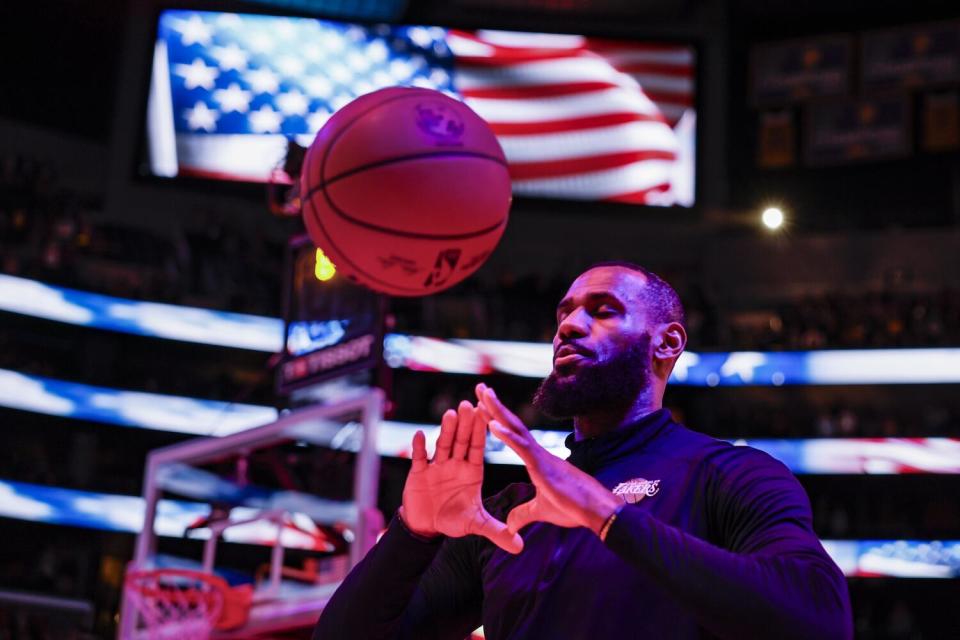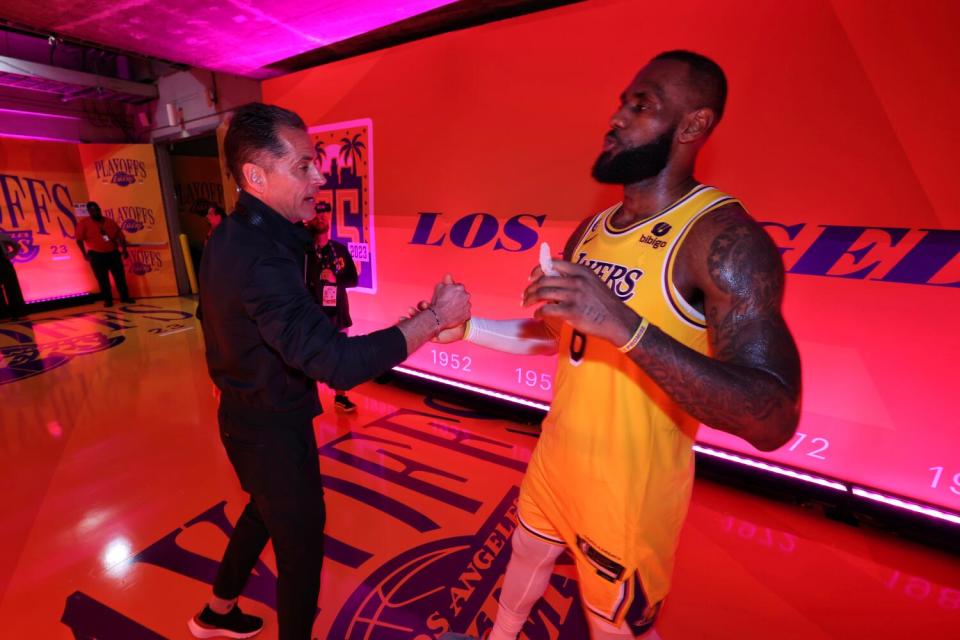Plaschke: By staying pat at trade deadline, Lakers win and LeBron James loses

Amid all the grading and grousing around last week’s NBA trade deadline, there was one odd winner and one unusual loser.
Odd and unusual, because both wear the same uniform.
The winner was the Lakers.
The loser was LeBron James.
The winner was the Lakers because basketball boss Rob Pelinka smartly refused to trade an important first-round draft pick and important young star Austin Reaves for the marginal improvement that would have come with Atlanta’s Dejounte Murray.
The loser was James because he wanted Murray, bad.
Read more: Spencer Dinwiddie signs with Lakers after clearing waivers
The winner was the Lakers because Pelinka would no longer mortgage the future to satisfy the whims of basketball’s ultimate win-now superstar.
The loser was James because, finally, somebody in the organization told him no.
Finally somebody recognized the brand was bigger than the player. Finally somebody acknowledged that further gutting the future to satisfy an aging legend would have looked pretty silly if, in six months, that legend were to leave.
That’s what could happen. That’s on the table now.
Let’s be very clear about this: The Lakers' refusal to capitulate to James’ trade mandate could result in James eventually refusing to exercise his $51.4-million player option after this season.
That’s a lot of money to give up, but, at age 39, James might make that sacrifice if he thinks he has a more immediate chance at winning one more championship elsewhere.
It’s a big risk, but it’s a risk the Lakers are now clearly willing to take, and good for them.
The downside: They would lose a front-row seat to what could be the final season of arguably the greatest player in basketball history.
The upside: They could breathe again.

No more being held hostage by a player who understandably doesn’t care about your future. No more fruitlessly plugging holes in the foundation that is cracking around one high-priced monument.
They will have money to sign a younger star. They will have three movable draft picks to trade for another younger star. They can remodel this team in the image of Anthony Davis, who has proven thus far this season that he has physically and mentally matured to meet the challenge.
The Lakers can finally stop being the LeBrons and start being the Lakers again.
So, yeah, they didn’t make a deal and, for once, that was a good thing.
After the passing of Thursday’s deadline, both parties stated their position.
In one corner, Pelinka sounded confident.
“We didn't want to shoot a bullet now that would only lead to very marginal improvement at the expense of making a much bigger and more impactful movement potentially in June and July,” he told reporters.
In the other corner, James sounded beaten.
When asked what it would take for a healthy Lakers team to get in a good position for the postseason, he didn’t answer.
“I don’t know, not sure, we haven’t gotten to that point, it’s hard for me to say,” he said.
In one corner, Pelinka sounded hopeful.
“Sometimes continuity takes time and takes patience and you just have to let it develop,” he said. “That said, if the right move would've been there at the right price, we would've pulled the trigger … but the right one just didn’t present itself.”
In the other corner, James seemed resigned.
Asked about the possibility of internal growth in the wake of the failure to add a star, once again he couldn’t answer.
“Just health,” he said. “Our whole year has been about health.”

Pelinka surely saw James’ hourglass tweet, and heard his noncommittal answers in New York when asked about the future, and he definitely spoke to James about the team’s future.
“The last conversation I had with him was he was focused on the guys in the locker room and making 'em the best players and teammates they could be. … He knows as our leader and as our captain that building those guys up and getting the best version of themselves is gonna be important to the run we make,” Pelinka said. “So I'm excited to see that unfold.”
Excited is one word for it. Frightened is another word.
While Pelinka mitigated James’ loss by adding veteran guard Spencer Dinwiddie from the buyout market, he still didn’t get James the player he wanted. And unless Jarred Vanderbilt and Gabe Vincent return to full strength from injuries, this team seems destined for a second consecutive spot in the play-in tournament and a possible early playoff exit.
It doesn’t look like a championship journey. But if it leads to a summer where they can finally rebuild for future journeys, then it will be worth the temporary frustration.
At least for some.
But probably not for James.
The question is still, how long will James stay interested in a roster that he doesn’t consider complete? And how much can his aging body devote to this kind of leadership when it’s increasingly going to require all of his attention to be ready to play?
So far the results are mixed.
In the first game after the trade deadline, the Denver Nuggets ran an almost exact replay of last season’s playoffs by out-executing the Lakers down the stretch in an eight-point Lakers loss.
But the next night, as if a trade burden had been lifted from their shoulders, Reaves, D’Angelo Russell, and Rui Hachimura joyously combined for 78 points in a 17-point victory over the defenseless New Orleans Pelicans.
So it will probably go for the rest of the season, stumbles followed by leaps, pain mixed with pride, their hopes relying on role players harnessing last season's magic mixed with improved health, all without the benefit of an acquired third star.
In this high-stakes game of chicken, it is a price the Lakers will accept, yet a price LeBron James might not.
Sign up for our weekly newsletter on all things Lakers.
This story originally appeared in Los Angeles Times.

